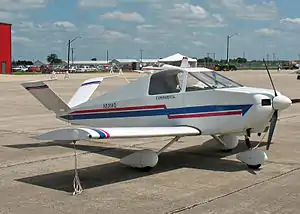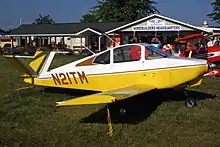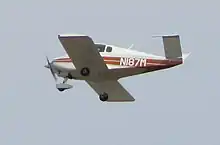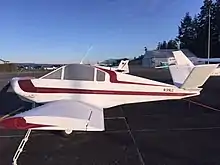Davis DA-2
The Davis DA-2 is a light aircraft designed in the United States in the 1960s and was marketed for homebuilding.[1] While it is a low-wing monoplane of largely conventional design with fixed tricycle undercarriage, the DA-2 is given a distinctive appearance by its slab-like fuselage construction and its V-tail.[2] The pilot and a single passenger sit side-by-side. Construction of the aircraft is sheet aluminum throughout, with the sole compound curves formed a fiberglass cowling and fairings.[3]
| DA-2 | |
|---|---|
 | |
| Role | Civil utility aircraft |
| Manufacturer | Homebuilt |
| Designer | Leeon D. Davis |
| First flight | 21 May 1966 |
| Primary user | Private pilot owners |
| Number built | ca. 45 by 1985 |


The prototype made its first flight on May 21, 1966, and was exhibited at that year's Experimental Aircraft Association annual fly-in, where it won awards for "most outstanding design" and "most popular aircraft".[4]
A major design consideration was ease of assembly for a first time home aircraft builder. Examples of this include: few curved components, a V-tail is one less control surface to build, and each wing is made from two sheets of aluminum with no trimming involved.[5]
The DA-3 was a single DA-2 enlarged to accommodate four people. Work proceeded through 1973-74, but the aircraft was never completed.
Plans have been intermittently available over the years. They are as of August 2019, available from D2 Aircraft.
Operational history
Examples of the DA-2 have been completed in the United States, Canada and the United Kingdom and are currently (2015) actively flying in those countries.
Variants
- DA-2 -- Continental A-65 powered
 1979 Davis DA-2B
1979 Davis DA-2B - DA-2A—Continental O-200A powered
- DA-2B—3 inch lower roof line[5]
- DA-3
- DA-Bandit-Corvair powered
Specifications (typical DA-2)
Data from Popular Mechanics August 1973
General characteristics
- Crew: One pilot
- Capacity: 1 passenger
- Length: 17 ft 10 in (5.44 m)
- Wingspan: 19 ft 3 in (5.86 m)
- Height: 5 ft 5 in (1.65 m)
- Wing area: 83 sq ft (7.7 m2)
- Empty weight: 610 lb (277 kg)
- Gross weight: 1,125 lb (510 kg)
- Powerplant: 1 × Continental A65 horizontally-opposed four-cylinder piston engine , 65 hp (49 kW)
Performance
- Maximum speed: 120 mph (193 km/h, 100 kn)
- Cruise speed: 110 mph (177 km/h, 96 kn)
- Range: 450 mi (725 km, 390 nmi)
References
- Notes
- Barnett Flight International 22 August 1977, pp. 534–535
- Weeghman, Richard B. (October 1966). "Rockford '66". Flying. Vol. 79, no. 4. pp. 52–53.
- Air Progress Sport Aircraft: 41. Winter 1969.
{{cite journal}}: Missing or empty|title=(help) - Taylor 1967, p. 247
- Davisson, Budd (December 2017). "cubic Efficiency". Sport Aviation.
- Sources
- Barnett, Cliff (22 August 1977). "Oshkosh Sport Aircraft Galore". Flight International. Vol. 112, no. 3571. pp. 532–541.
- Taylor, John W. R. (1967). Jane's All The World's Aircraft 1967–68. London: Sampson Low, Marston & Company.
- Taylor, Michael J. H. (1989). Jane's Encyclopedia of Aviation. London: Studio Editions. p. 305.
- Jane's All the World's Aircraft 1985-86. London: Jane's Yearbooks. pp. 587–88.
- Davisson, Budd (May 1973). "Flying the Davis DA-2A Homebuilt". Air Progress.
External links
Builder Group
- http://www.davisda2.com Current source for plans also a users forum.